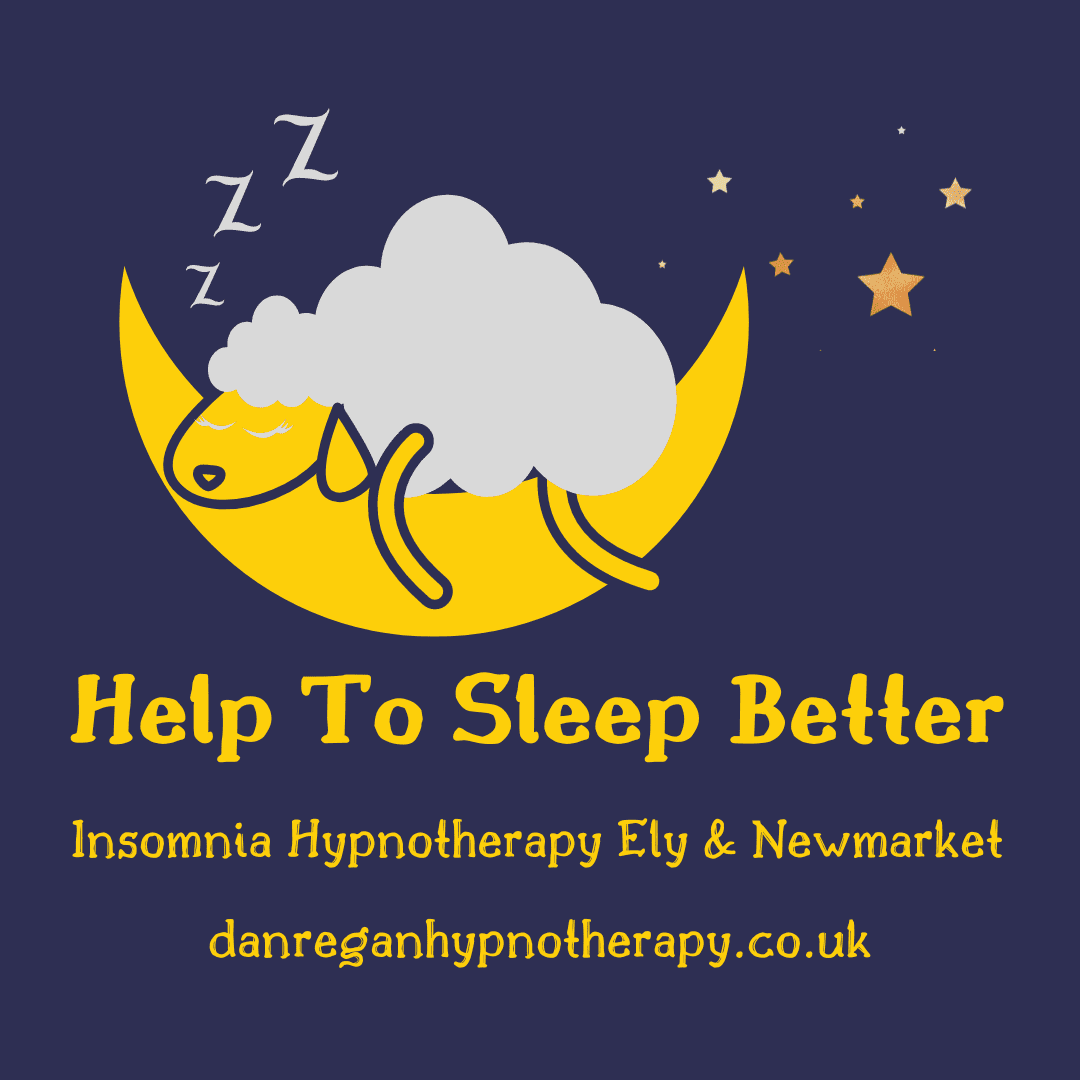
Hypnotherapy To Help With Sleep Disorders – Insomnia Hypnotherapy in Ely and Newmarket
Is there anything worse than sleep deprivation? Well, maybe there are some things that are worse but a lack of regular, quality sleep definitely appears high up on the list of things that can affect your mood, mindset and well-being.
If you struggle with anxiety, stress, worry or have a tendency to overthink then getting to sleep, and staying asleep, can be a real issue. The state of your sleep is something I always ask about when you first come to see me because of how much it can impact upon your daily functioning. It becomes harder to challenge your own thoughts if you are tired and can lead to feeling low, down and sluggish. Even small daily tasks can seem like huge challenges to overcome and you may find yourself turning to caffeine and sugar to get through the day.
Probably most of us have the odd night that is disturbed. Perhaps we have something on our minds, or you wake up from a noise or needing the loo and your mind starts going, or maybe the kids are going through one of their phases of disturbed sleep that then impacts upon everyone. If it is the occasional night then it is probably something manageable and may not adversely impact upon things too much.
There are few things that aren’t improved by sleeping well. It becomes easier to manage your own thoughts and feelings and to make better decisions. You have more energy for things and you can feel more ready to handle, deal, cope with whatever comes your way.
Yet poor sleep and insomnia can exacerbate anxiety and stress, make your racing thoughts harder to manage and can lead to weight gain and less reasoned decisions. And if you are in a pattern of poor sleep, you may even feel anxious or dread going to bed because of the hours of struggle and frustration ahead. You may start to delay going to bed because of your insomnia and you may have started to develop all sorts of unhelpful thoughts, feelings and habits that means a decent night’s sleep is now seemingly further away from you than ever.
Sleeping Well and Insomnia Free
Now I don’t know about you but usually when I go away somewhere my sleep tends to be even better than normal. Being in a comfortable, albeit unfamiliar, bed and sleeping environment can affect some people, at least initially, as their routines are all a bit out of the normal. For others, sleeping on holiday or while away can (assuming it’s dark, quiet and comfortable) improve their sleep and be a lovely part of the going away experience.
One recent insomnia hypnotherapy client I’ve been helping told me how he struggles to get four hours a night when at home yet when away by the coast he finds that he sleeps much better. Whether it’s the sea air, the calming sound of the waves, a different environment (because we absolutely can get stuck in a negative sleep cycle at home) or the absence of work stress, being away can make a difference to your sleep (although not for everyone). If you can ever sleep better somewhere or sometimes then it is certainly possible to improve your sleep, overcome insomnia and become a consistently and habitually better sleeper.
Recently we headed over to Ironbridge for a couple of nights and I have to say that I slept like a log! Maybe it was being away from the usual chores and activities or maybe it was the excessive amount of walking that we did (if I was missing my weekend running then I was absolutely covering several miles of walking instead….and dragging the kids along with me!). It really is a lovely little place with lots of history and walkways and I’d love to go back in the future and explore the area some more.
And here we are mid exploration!

Or for those of you who would rather just see the immense, historic bridge itself then have a look at this:

It really is a lovely place and we enjoyed exploring some of the woodland walks, the maze of paths that flow between the houses on the hill, as well as the massive variety in terms of buildings there (although I would not want to drive up some of the little hill roads in the winter!).
All that walking probably did contribute to us all sleeping well. And, for the most part, my regular sleep pattern works nicely too. I unwind and switch off from the day by reading before I go to sleep, and if I wake in the night I use a couple of techniques to calm my feelings and interrupt my thoughts (or better still, to stop my brain from getting going on something I don’t need to think about at 3 a.m. after I’ve been for a pee).
When I work with clients about sleep issues and insomnia, I help them learn how to let go of the busyness of the day, how to physically relax ready for sleep and how to direct their thinking and orchestrate their thoughts for calmness. As well as that they learn how to counter any feelings of anxiety, frustration and dread that they may have just thinking about sleep, let alone when getting into bed, along with how to tackle any unhelpful habitual barriers to sleep that have built up.
And there is more on sleep disorders and insomnia in these articles:
Is Cell Phone Addiction a Thing? Smartphone Use, Sleep, Anxiety & Depression
Anxiety and Dreaming – How Your Anxiety Impacts While You Sleep
Sleep Disorders – The Epidemic of Sleep Deprivation
How To Sleep Better – Seeking Solutions When You Can’t Sleep
Hypnotherapy for Sleep Disorders and Insomnia
Hypnotherapy can draw upon many ways of of helping you to become more mentally calm and physically relaxed so it is perhaps no surprise that it can work very nicely to help with overcoming sleep disorders and insomnia. You can learn how to change your habitual thoughts about sleep, your expectation of whether you will sleep well and start to calm your thoughts and relax your body to support sleeping better.
There’s also a wealth of evidence for how hypnotherapy can help with other issues that might be impacting upon your sleep, such as anxiety, stress and overthinking. Often when you sort these psychological problems, sleep starts to improve all by itself. If not, there are plenty of ways to quieten the mind and relax yourself. Evidence suggests that hypnotherapy and relaxation techniques can help with anxiety / depression symptoms where there is also primary or secondary insomnia (Holdevici, 2014).
So if your daily anxiety, stress and overthinking is spilling into your night time hours then it certainly is very possible to start feeling calmer, confident and in control. Rather than lying awake for hours catastophising or ruminating, you can calm your mind and quieten your mind as you resiliently start to deal with things and handle things.
Of course, sometimes it is just the lack of deep, quality sleep itself that is the stressful thing in your life, making your waking day that much harder as you deal with tiredness, fatigue and mental fuzziness. And hypnotherapy can help you with improving your sleep too. As a caveat, if your sleep has become problematic, checking in with your GP can be helpful to identify any non-psychological and non-behavioural issues and contributors.
There is a plethora of research suggesting that combining cognitive behavioural therapy with hypnosis is therapeutic for a variety of psychological, behavioural, and medical disorders (Graci and Hardie, 2007). Your sleep issues may involve difficulty getting to sleep, staying asleep or waking very early and being unable to get back to sleep (as you watch every minute on the clock passing by while wondering how you’ll cope with the day ahead). You don’t get the quality of duration of sleep that you feel you need and that then impacts on your daily functioning and your mood.
Now sometimes there can be external factors that impact upon your sleep for a night or two. For example, as I write this we are experiencing a bit of a heat wave here and that can make things uncomfortable at night and you can find yourself struggling to sleep well for a few nights. Or if there is a major stressful event or circumstance in your life right now (e.g. a bereavement or a relationship breakup) that can impact for a while until, after a time, your sleep returns to its usual pattern (and as mentioned above, hypnotherapy can help you with dealing with stress, anxiety and worry that has a knock on impact upon your sleep).
However, you may have found that your sleep disorder / disturbance and insomnia have been going on for some time. You consistently and habitually struggle to get the quality and quantity of sleep you feel you need in order to function well. As well as the tiredness, possible low mood and struggle to get through the day, your thoughts and feelings about sleep can lead to anxiety, dread and worry. I’ve helped people who come to their first session filled with anxiety about going to bed and trying to sleep and who then find themselves tense, anxious and ruminating when they finally go to bed at night (after they may have been putting that moment of finally going to bed off for some time).
There can be a whole range of psychological, behavioural and environmental factors that contribute to sleep disorders and insomnia.
Help With Insomnia and Sleep Disorders
Whether it just happens or is initially a response to a particular circumstance or situation, problems getting to sleep and staying asleep can soon become more enduring, more problematic and more habitual. You might stress about whether you’ll get enough sleep (or any sleep) that night. You might start taking herbal remedies or medication to help (which can work short term for some people but are not an ongoing solution). And all of the good habits, routines and patterns that you are told you should be following can start to go out the window because nothing seems to help you sleep anyway.
The odd night of poor sleep leads to a groggy next day but is unlikely to have any lasting effects if things then soon return to normal. I’m always reminded of reading a book about marathon training that talked about how you should probably expect to have a bad night of sleep before the race because of nerves and excitement yet how this wouldn’t affect your race performance. And I always remind myself if my sleep is disturbed that if I could get up and run a marathon with my sleep impacted, then I should be able to get through a normal day ok.
Yet, with sleep disorders and insomnia, your sleep issues just go on and on. You might sleep for a couple of hours and then wake up feeling totally alert and wide awake. You might spend hour after hour tossing and turning and getting frustrated that sleep isn’t happening, perhaps just getting an hour or two before the alarm goes off and you have to get up and get on. Those hours through the night can seem endless and your thoughts can seem worrying and all consuming. You can feel anxiety about your sleep disturbance continuing and you can start to inadvertently exacerbate unhelpful thoughts, feelings and behaviours that make good sleep seem ever more distant to you.
You’ve probably heard all of the behavioural suggestions before. You know you should reduce caffeine, nicotine, alcohol and other stimulants in the afternoon and evening to help promote better sleep. You know you should have a regular bedtime routine, stick to a regular going to bed and getting up time (even on days off) and switch off screens for at least an hour before you plan to go to sleep. A relaxing wind down routine in the lead up to bedtime should be created and maintained and you should only use your bedroom for sleep and sex. There are also some other behaviours that can help like exercising earlier in the day, avoiding napping, making sure your bedroom is comfortable and so on.
It’s pretty usual that people have tried all of these things as their search for good sleep becomes more desperate and seemingly more futile. And so the screens can start to reappear, the routines become less structured, and limiting things like alcohol and caffeine can become more hit and miss. Of course, how these things affects you varies from one person to the next. I’ve spoken to people who could down a strong coffee and then thirty minutes later be out like a light until their alarm goes off. Some people could lie in bed watching TV on their ipad and then doze off quite contentedly. I was working with one client recently who realised she needs to turn her screens off at least two hours before bed if she is going to sleep well. All these factors can play out a little differently amongst us all. Yet if your sleep isn’t as good as you want it to be, it makes sense to get all the sleep hygiene behaviours in place. Even if it seems they aren’t helping you sleep better, not doing these things can certainly hinder you from improving your sleep.
Perhaps of more significance here are the psychological factors that impede you from getting and staying asleep. Cognitive behaviour therapy and hypnotherapy can help you with dealing with the thoughts and feelings that interfere with you sleeping deeply, happily and naturally. You may have been worrying about your disturbed sleep and how it may impact upon your life and the sort of problems that may be caused if it continues (such as an impact upon your employment or studies, not wanting to socialise and so losing friends and so on). You may worry about your sleep and going to bed when it crosses your mind earlier in the day. You might get anxious and tense as the evening draws on and when you know you’ll have to face the same nightly ordeal all over again. Your anxious thoughts and feelings exacerbate things and you get stuck in a cycle where you expect to struggle to sleep, find it happens and then start to assume it will always be that way.
Utilising cognitive behavioural hypnotherapy strategies and approaches can help you to interrupt unhelpful thought processes and to once again start feeling relaxed, safe and calm about sleep and when you are ready for sleep.
Some people notice significant improvements in their sleep sooner than others, and much may depend upon where you are now with sleep and what would be a successful outcome for you from your hypnotherapy. If you’ve only been getting a couple of hours a night then achieving four or more hours may seem like a miracle to you (that you can continue to build upon). If you’ve been worried and anxious about sleep then feeling calmer and more relaxed about things may be an immense relief. And having ways to calm feelings and interrupt thoughts at night becomes a way of taking back control, relaxing and drifting off easier. You can prepare your mind and body for sleep effectively and find yourself more rested and relaxed in mind and body until it is time to get up.
Hypnotherapy can help you with your sleep disorder and insomnia so you start sleeping better and better, and getting that good sleep can make a massive difference to your well-being and quality of life.
To your health and happiness,
Dan Regan
Sleep Disorders and Insomnia Hypnotherapy in Ely & Newmarket
Struggling with insomnia, sleep disorders, anxiety or excessive worry and need some help? Find out how I can help with a Complimentary Hypnotherapy Strategy Session. Learn more here: Appointments
Find out what over three hundred other people have said after their hypnotherapy sessions with Dan: Hypnotherapy Testimonials
And check out these powerful hypnosis downloads that can start helping you right away with anxiety, confidence and more: Hypnosis Downloads
References:
Graci, G.M. and Hardie, J.C., 2007. Evidenced-based hypnotherapy for the management of sleep disorders. Intl. Journal of Clinical and Experimental Hypnosis, 55(3), pp.288-302.
Holdevici, I., 2014. Relaxation and hypnosis in reducing anxious-depressive symptoms and insomnia among adults. Procedia-Social and Behavioral Sciences, 127, pp.586-590.




0 Comments